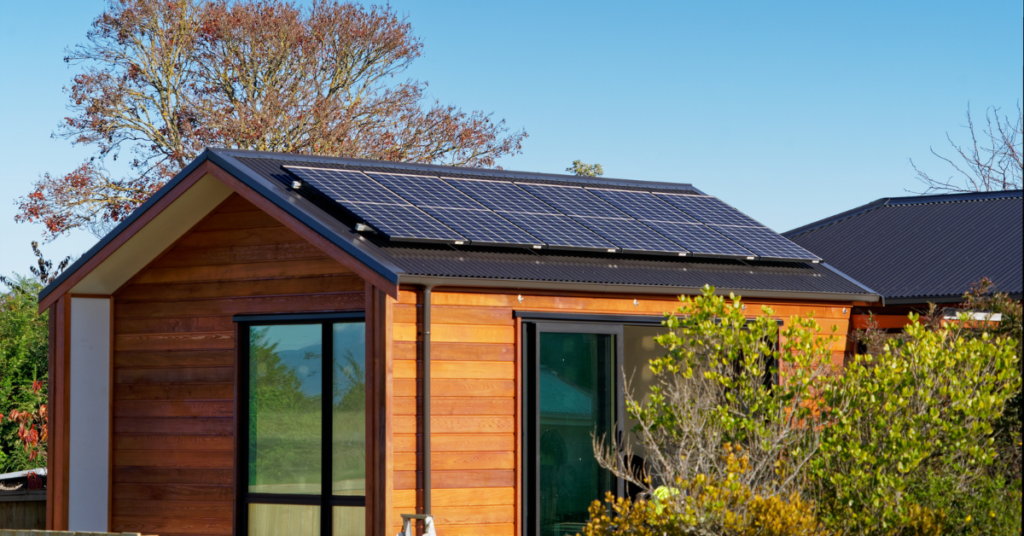Living off the grid is a lifestyle we think about at least once. But how to live off the grid?
It takes preparation and planning to succeed at the beginning of your freedom and self-sufficiency.
Buying your own land first, building your house, and generating your own power, are only the beginning.
To learn skills such as growing food in a garden, preserving, and canning. How to collect water ( E.g., rainwater harvesting) and how to manage your waste.
Everything comes within your freedom.
It’s a process in which you become gradually get better and better.
You’re approaching a fully self-sufficient and -reliable life.
Land
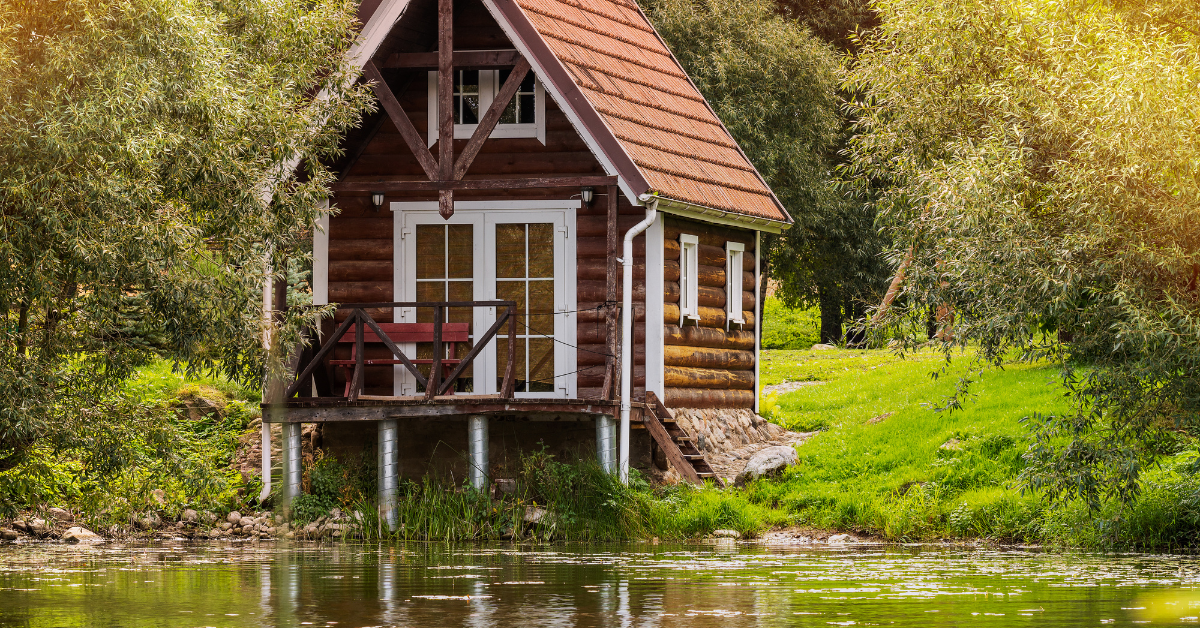
Having suitable land when it comes to off-the-grid living is essential. A well-chosen land depends on your needs and where you want to live. Your budget should also fit your needs.[1]
Consider a land with resources such as water and trees.[2]
Good soil so your vegetables can proliferate is also essential. A rural area, in which you can forage, is also handy to have for extra food. Rural and remote areas are most likely cheaper.[3]
Keep in mind to have easy access to your land via a road.
You must check the zoning laws of the land you are considering buying.[4]
Zoning and local laws dictate where you can build, how large, and what building codes reign.[5]
The climate determines what kind of energy generation you can use and how well your crops will grow. When it’s more sunny than windy, thinking about power generation, choosing solar panels over wind turbines is obvious.[6]
Home
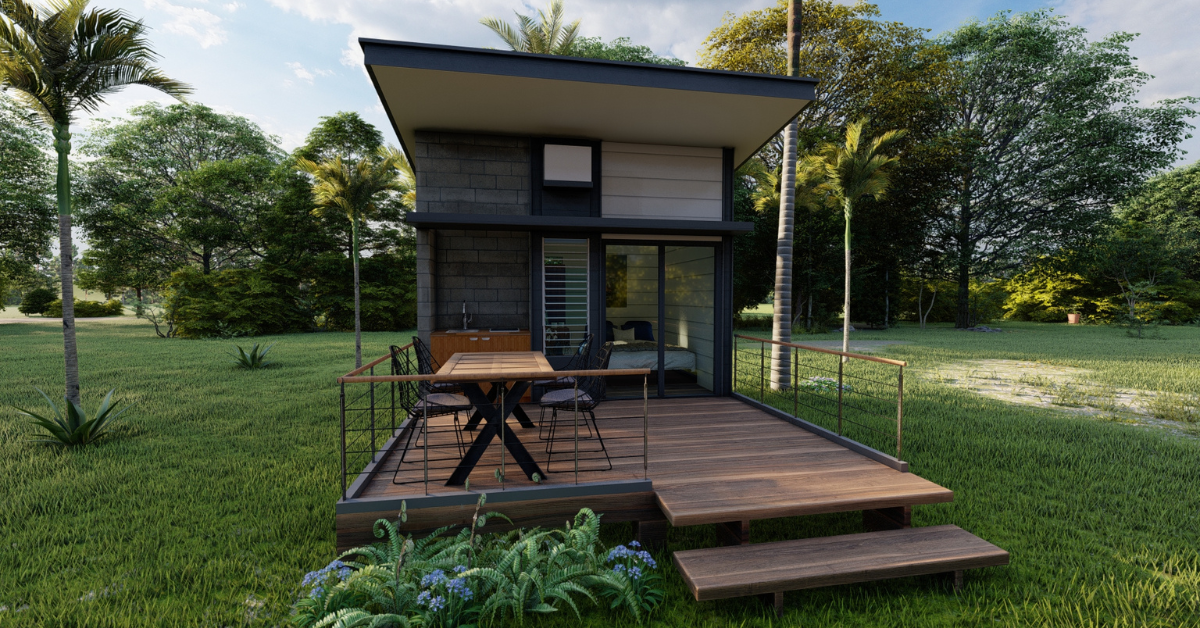
Going off the grid with your current home may not work out. You may have to buy or build your very own Off-Grid House.[7]
When you’re in the beginning, you can construct your house on the grid and build your way into independence one by one. But keep in mind, either way; this won’t be cheap.[8]
How much off-grid homes cost depends on many factors such as location, size, initial off-grid utensils, and size. You can calculate with something between 150,000$ to 250,000$.
Keep in mind that some homes cost little as 50,000$, while others can cost over $1 million.
The typical home values price in December 2022 of homes in the U.S is 357,319$[9]
Off-Grid homes do cost less than conventional houses. But it can initially cost more than a house on the grid because of the expenditure of power generation and storage, water collecting and treatment, and a waste disposal system.[10]
It highly depends on your specific needs.
But the house will cost less in the long term as you no longer have to pay monthly for residential utility.[11,12]
It’s also an option to live in an RV or Camper.
You can choose between a lot of different off-grid house designs. Here are just a few ideas you may want to look out for:
Tiny House: Small, compact, and energy friendly. Less expensive to buy and maintain than traditional homes.[13,14]
Costing approximately 45,000$.[15]
Earthships: Made from natural and recycled materials. Water-saving features are often included.[16]
Hard to believe, but these two build an Earthship for less than 10,000$.[17]
Yurt: Due to its easy setup and take down, a yurt is a popular option. It can easily be transported to another location. Less expensive than a typical house and can be adapted to different places with different climates.[18]
The average cost of 35,000$.[19]
There are plenty of different off-grid houses.[20]
Power Generation & Storage
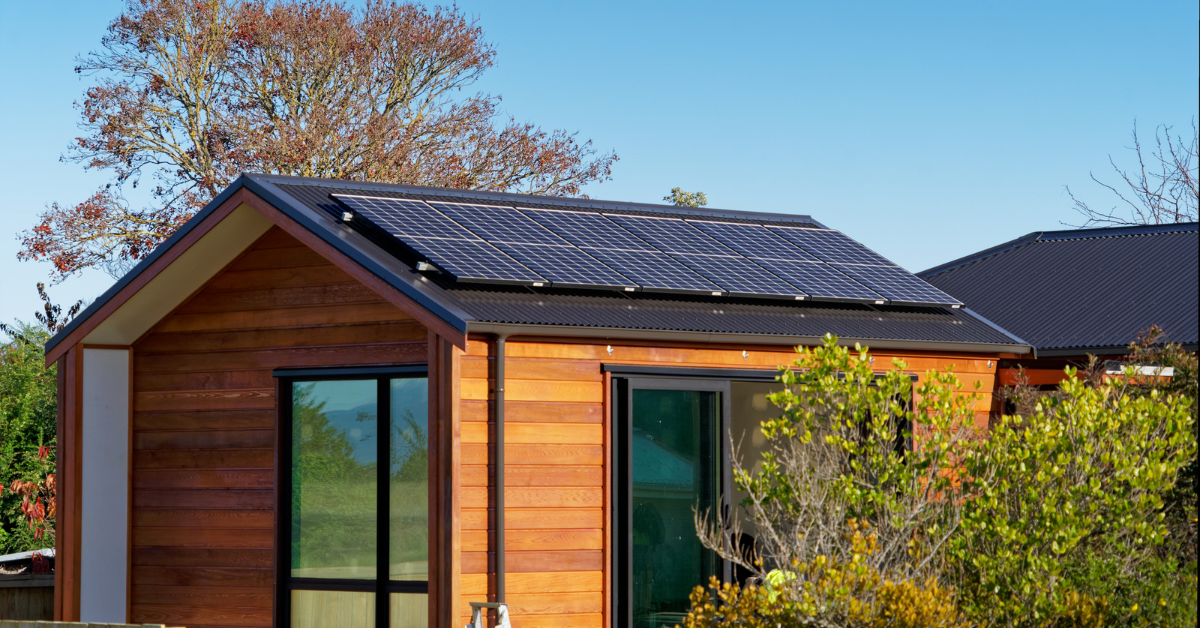
Off-Grid means living independently from the power grid of the government. That requires you to generate your own. Your best option depends on the location of your homestead.[21] Let’s say you have a stream next to your home. Using that natural source for your power generation is a good option. But more to that further down.
A customer’s average annual electricity consumption was about 886 kWh per month.[22]
Solar Power
Solar panels are the most common way to produce electricity for off-grid homes. To convert sunlight into electricity or to produce hot water. These systems are so good because they are reliable and easy to maintain.
Solar-installed systems cost an average 55,000$[23]
While the average cost of solar panels is 20,020$[24]
Wind Turbines
Small wind turbines are a great combination with solar panels, as they produce power when the sun is most likely not shining.[25]
Wind turbines are your best choice if you live in an area with lots of wind.[26]
Every kilowatt can cost you between 3,000$ to 5,000$ according to the American Wind Energy Association (AWEA)[27]
The average installation for the primary source of electricity needs to generate 5 to 15 kW. Which sets your budget back 15,000$ to 75,000$.[28]
Micro-Hydro Power
Only a few people know that micro-hydro power systems use the energy of flowing water to generate electricity. This is your best choice when you live in an area with a stream or river.[29]
It always indefinitely generates power as long as the water flows.[30]
Micorgydro Systems do cost per kW around 1,500$ to 6,000$.[31]
Power Storage
Store your electricity is not necessary, but comfortable to have![32]
Let’s say your primary electricity generation system is a solar power system; you’ll need to store the excess energy you have not used in batteries.
Backup Power Generation

Suddenly, your main power generator stops working, and you must repair it. You’re always happy to have a backup when it comes that far.[33,34]
One good backup choice would be a second choice from above; when you live nowhere near a stream, pick a wind turbine that fits your electric needs. Otherwise, you’re always good with a generator that uses fuel like diesel.
Water
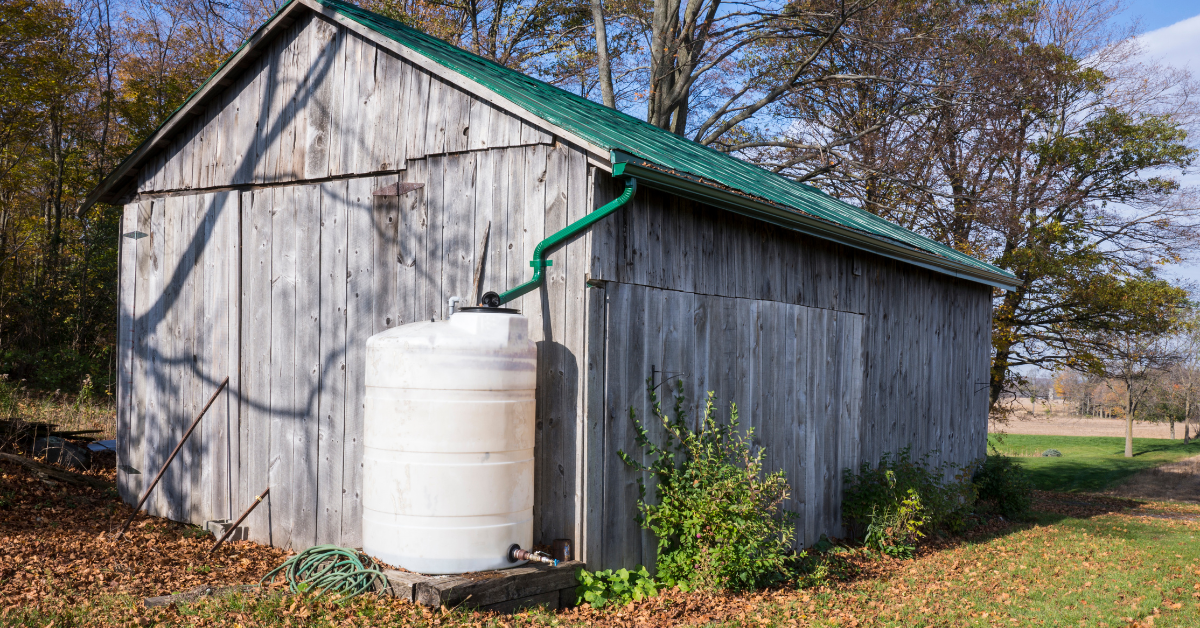
Living near a natural water source, like a lake or stream, will be convenient for your needs. Check your water if it is safe to drink; it may be infected with bacteria, viruses, or parasites.[35]
Boil or filter the water before drinking. Read here how to purify water.
Drilling a Well
Consider professionally drilling a well to secure clean and fresh water whenever you need it.[36]
Digging your well may be no good idea, as you need special knowledge of your area to ensure you get a reliable water source.[37]
Off-Grid wells must be drilled deeper than traditional wells because they must hit a particular underground layer of water-bearing rock or sand.[38]
Check that drilling a well on your property is permitted.
Rainwater Collecting
Collecting and storing rainwater in tanks or barrels is a steady way of obtaining water.
You can also install a rainwater collecting system for your off grid home.[39]
Remember that rainwater may be unsafe to drink, and you should purify it before.[40]
Greywater System
This system reuses your household wastewater from sinks, showers, and laundry. It will be reused for irrigation or flushing toilets.[41]
Greywater is used water and should not be used for cooking, cleaning, or drinking.
Food
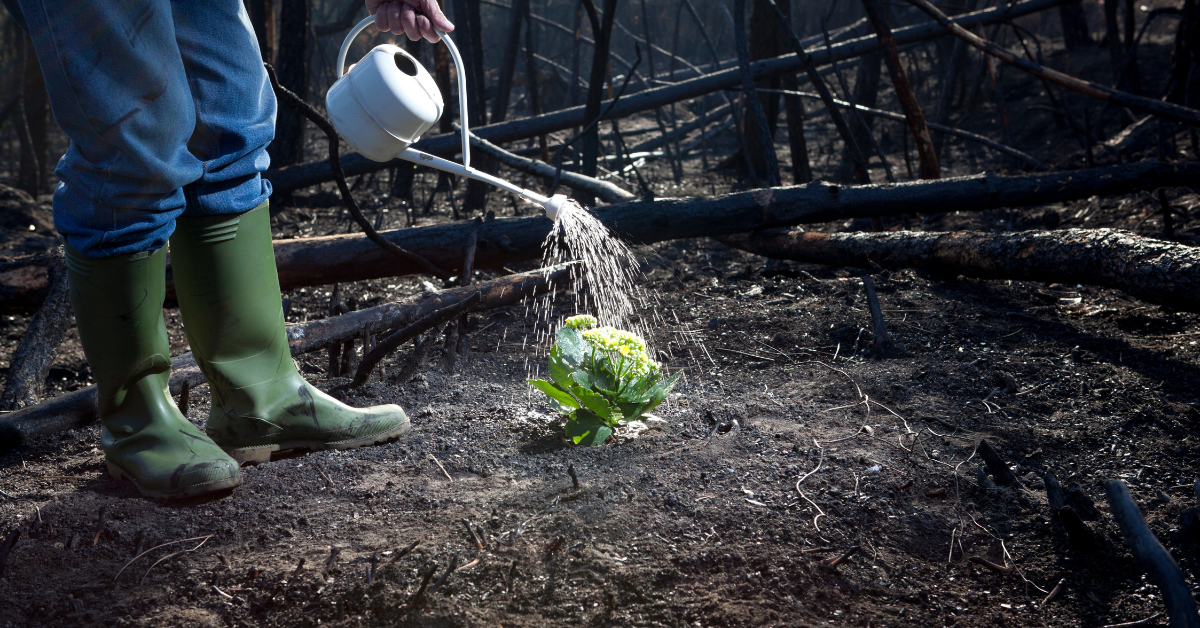
To live off the grid doesn’t always mean you have to gather and hunt for your food own food, though.
But if you want to do so, you’re absolutely fine too, as long as the laws allow it. Do the following things to become more independent.
Growing Food & Foraging
Everyone who ever grew a food supply knows how impactful it is. To have a garden you can feed your family with is an absolute feeling of self-sufficiency.[42]
Depending on the climate in your region, choose what crops have the highest chance to grow and supplement you with food.[43]
Starting a greenhouse and garden, growing a few trees, plants, and berries is always a good option for your homestead.[44]
You can forage berries, fruits, and more in your environment. Keep an eye open for those. Before eating anything you don’t know, read it up in good books or ask experts to check if it’s safe to eat.[45]
Keeping Animals
Even when you’re not planning to slaughter any animals, you can still earn from their milk or eggs.[46]
Hunting & Fishing & Trapping
Always check the rules in your country before doing anything, as you probably need a license to hunt.[47]
Preserving & Canning
After harvesting, you want to preserve and can your outcome to make the shelf life as long as possible.[48]
Freezing
Professional freezers can stay cold for days without energy input, something you certainly want in case of a disaster.[49]
Waste Disposal & Septic Tank
When you live entirely an off the grid lifestyle, you’re most likely not connected to the municipal sewage system. The most common way to deal with your waste is a septic tank.[50]
Respect the rules that reign over that topic. Do not attempt to build your septic tank, as a leak comes with severe consequences. It Contaminates a large part of your land.[51]
A septic tank costs an average 3,500$ to 11,000$.[52]
A septic tank is an underground tank connected to your wastewater and plumbing system. While solid waste settles down to the ground, the liquid flows out of the tank into a drain field, where it is treated before entering the groundwater.[53]
Septic tanks need regular maintenance and must be pumped out every 3-5 years.[54] Depending on the use and capacity of the tank.
Another good waste disposal choice is composting toilets. These use a combination of bacteria and evaporation to break down human waste. After a while, the waste can be used as fertilizer.[55]
Clothing
Clothing is crucial for surviving when living off the grid, as you might go outside to work in the winter and summer. You need proper clothing for extreme temperatures, wind, rain, and snow.
Footwear for the winter is such an important thing to have, as it provides traction when you work outside.
When your generator goes off and your heating with it, you’ll be better off living off grid and having too many warm clothes than too few!
Cover yourself with the proper clothing whenever needed, and watch out to have enough for everyone around you.
Mental & Physical Preparation
Independence means responsibility.
It would help if you were mentally prepared for what may come. You’ll have to know you’ll get over this when everything falls apart. This is done with the right mindset.[56]
Living off the grid means no electricity, a sewing system, and water from outside. You got to have a specific skill to lift that all on your own or with your family. Living an off the grid life also means a lot of physical work. You need a stable and healthy body.
Developing self-sufficiency skills and learning how to live with the material you got is essential. Read and learn everything about the named topics before going in blindly. You can rent a tiny home and live off the grid for a few days or weeks to understand what it’s like.
Benefits
The most beneficial topic is your self-sufficiency. You’re not only prepared when a disaster occurs or in emergencies. You can live on your own.
You live a simpler life; you only care for yourself and your family. There is some piece in growing and harvesting your food, gaining electric power from the sun, collect rainwater and other natural resources.
You will have so little to spend your money on that you’ll start saving considerably. You don’t have to buy everything from a store; you pick your food from your garden!
Neither do you have to pay monthly for your electricity, as you generate your own.[57,58]
Building and extending your property how you want to. You’re responsible for maintaining the most things in your near.
The best part is your constant learning about new stuff. You’ll have to keep up with new date technologies and practices. Education will never end, and living an off the grid lifestyle is just one big adventure.
You can start building groups or joining one. Creating a community and sharing knowledge and resources with others is so enjoyable.
Tips For Living Off The Grid
- Start small Is the first tip I want to give you. You don’t have to rush anything. There are a lot of things to consider before going off the grid. Start installing a small solar panel, start a small garden, to get in touch.
- Make a plan Build up a list of resources and skills you will need. Going off the grid needs lots of preparation. Get a feeling and make some calculations for how much power you need to generate, and think about your waste management and food production.[59]
- Learn to preserve and can foods Be mindful of your food and resources.
- Get enough exercise and sleep. Take time to relax and unwind, as living off the grid can be challenging.
- Reduce power usage The less Electricity you’ll need, the less you have to generate. Using less power is so simple; a few easy adjustments will probably do enough. Turn off unnecessary lights, plug out things you don’t use now, use LED instead of standard light bulbs, and insulate your home.
- Produce less household waste Do something for yourself and the environment.[60]
- Educate yourself You can find countless books and videos about gardening, power generation, etc. You have to choose to do so.[61]
- Have Fun In the end, living off the grid is a lifestyle choice. You have chosen to live like that, and you should be happy. Do not take things too seriously. Feel free to have fun and experiment with different approaches. [62]
Finally, I want to make you aware of our Prepping List with the most essential items to have!
